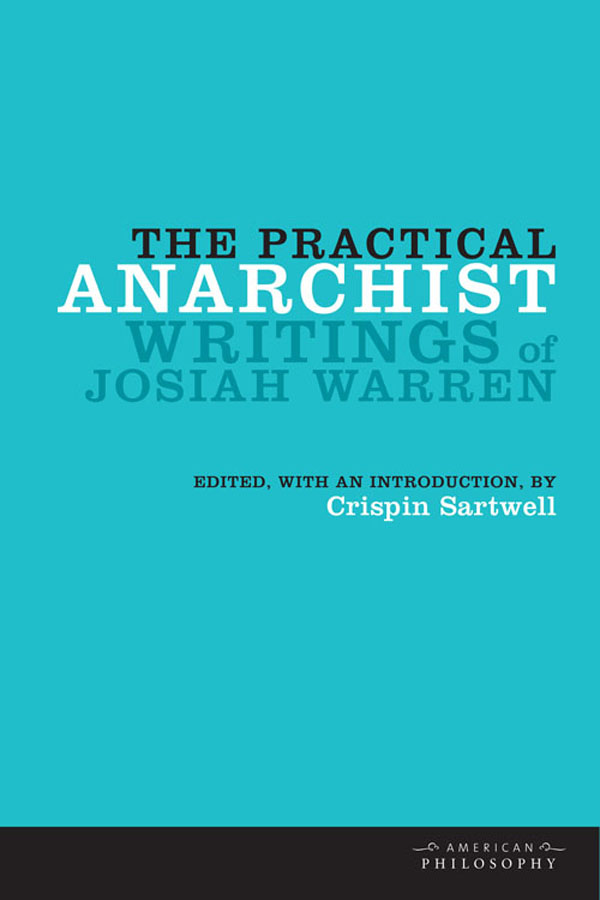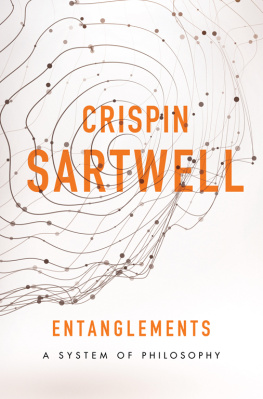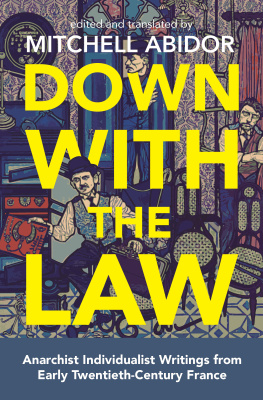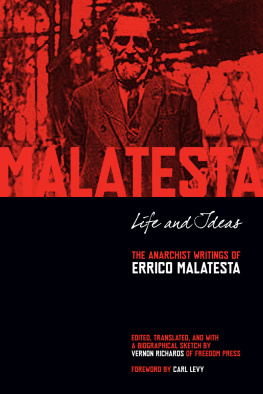Sartwell Crispin - The practical anarchist writings of Josiah Warren
Here you can read online Sartwell Crispin - The practical anarchist writings of Josiah Warren full text of the book (entire story) in english for free. Download pdf and epub, get meaning, cover and reviews about this ebook. City: New York, year: 2018, publisher: Fordham University Press, genre: Politics. Description of the work, (preface) as well as reviews are available. Best literature library LitArk.com created for fans of good reading and offers a wide selection of genres:
Romance novel
Science fiction
Adventure
Detective
Science
History
Home and family
Prose
Art
Politics
Computer
Non-fiction
Religion
Business
Children
Humor
Choose a favorite category and find really read worthwhile books. Enjoy immersion in the world of imagination, feel the emotions of the characters or learn something new for yourself, make an fascinating discovery.

- Book:The practical anarchist writings of Josiah Warren
- Author:
- Publisher:Fordham University Press
- Genre:
- Year:2018
- City:New York
- Rating:3 / 5
- Favourites:Add to favourites
- Your mark:
- 60
- 1
- 2
- 3
- 4
- 5
The practical anarchist writings of Josiah Warren: summary, description and annotation
We offer to read an annotation, description, summary or preface (depends on what the author of the book "The practical anarchist writings of Josiah Warren" wrote himself). If you haven't found the necessary information about the book — write in the comments, we will try to find it.
The practical anarchist writings of Josiah Warren — read online for free the complete book (whole text) full work
Below is the text of the book, divided by pages. System saving the place of the last page read, allows you to conveniently read the book "The practical anarchist writings of Josiah Warren" online for free, without having to search again every time where you left off. Put a bookmark, and you can go to the page where you finished reading at any time.
Font size:
Interval:
Bookmark:

THE PRACTICAL ANARCHIST
AMERICAN PHILOSOPHY
Douglas R. Anderson and Jude Jones, series editors


Copyright 2011 Fordham University Press
First Open Access edition, 2018
Open Access edition funded by the National Endowment for the Humanities/Andrew W. Mellon Foundation Humanities Open Book Program.

All rights reserved. No part of this publication may be reproduced, stored in a retrieval system, or transmitted in any form or by any meanselectronic, mechanical, photocopy, recording, or any otherexcept for brief quotations in printed reviews, without the prior permission of the publisher.
Fordham University Press has no responsibility for the persistence or accuracy of URLs for external or third-party Internet websites referred to in this publication and does not guarantee that any content on such websites is, or will remain, accurate or appropriate.
Fordham University Press also publishes its books in a variety of electronic formats. Some content that appears in print may not be available in electronic books.
Visit us online at www.fordhampress.com.
Library of Congress Cataloging-in-Publication Data
Warren, Josiah, 17981874.
The practical anarchist : writings of Josiah Warren / edited and with an introduction by Crispin Sartwell.1st ed.
p. cm. (American philosophy)
Includes bibliographical references and index.
ISBN 9780-823233700 (cloth : alk. paper)
ISBN 9780-823233724 (pbk. : alk. paper)
1. Warren, Josiah, 17981874. 2. AnarchismUnited States. 3. Utopian socialismUnited States. I. Sartwell, Crispin, 1958 II. Title.
HX843.7.W27 2011
335.83092dc22
2011013452
Printed in the United States of America
13 12 11 5 4 3 2 1
First edition
Contents
A summer grant from Dickinson College helped to fund research in collections and to obtain photocopies. I thank Dickinson for that and many other forms of support. My work on Warren has piggybacked on the exemplary research of Shawn Wilbur. Dana Wards Anarchy Archives website gave me my first real contact with Warrens texts, and earlier versions of some of texts reprinted here, including versions typeset by Warren, can be found there. The Wisconsin Historical Society, the Indiana Historical Society, the Labadie Collection at the University of Michigan, the Houghton Library at Harvard University, and the Working Mens Institute at New Harmony, Indiana, were of extraordinary aid in obtaining the materials contained in this book. Finally, I want to express my admiration for Josiah Warren: a half-cracked monomaniac but also an omni-competent human being. I admire his style of anti-leadership, based on anti-charisma: too reticent to tell you how to live. Rarely have extreme idealism and extreme realism been so idiosyncratically or so compellingly combined. It is a combination we may require yet.
The early- and mid-nineteenth-century United States produced a bewildering variety of individualists, in the sense of people who advocated the primacy of the human individual politically and of the particular thing metaphysically, and in the sense of seriously idiosyncratic persons who followed their own odd genius wherever it dragged them. It was, in many ways, a religious revival, but it soon sacrificed God on the altar of nonconformity. It produced undoubted geniuses of the caliber of Emerson, Fuller, Thoreau, Melville, Whitman, and Hawthorne. It produced social reformers as pure and intense as any that the world has knownsuch as William Lloyd Garrison, Elizabeth Cady Stanton, and Captain John Brown. And it produced utopians who thought they could found a new social orderincluding Adin Ballou, John Humphrey Noyes, Amos Bronson Alcott, and Josiah Warren.
Like almost all of these astonishing and exasperating people, Josiah Warren hailed from New England. Like Garrison (and Ben Franklin, Pierre-Joseph Proudhon, and Albert Parsons) he was a printer. Like John Brown he was a revolutionist, though Brown was violent and Warren, by his own declaration, peaceful. Like Emerson and Whitman, he sang, or in his case lectured, about free individuality and connected it to an understanding of the universe. Like Thoreau he loved simplicity and skill, and displayed them prodigiously as qualities of character and thought throughout his life. And like Ballouand the rest of these people at one time or anotherhe loathed the state and took steps to fashion a life without it.
You could think of Warren as an Emersonian avatar, someone who lived what The American Scholar, Self-Reliance, Nature, and even Fate taught at the very same time that Emerson was formulating those fundamental statements of the American character. He practiced wilderness self-sufficiency, anticapitalist economy, radical democracy that entailed extreme decentralization of decision making, and a metaphysics of particulars. In short, his philosophy was transcendentalism, and he practiced it as early as Emerson did. But unlike Emerson, he was devoted not to stating this philosophy beautifully, but to realizing it practically.
Josiah Warren was both a genius and a crank of nearly the first order. He has often been called the first American anarchist, though he called himself a Democrat. And though I am certain he wasnt the first American anarchist (since every state breeds skeptics, and since radical Protestants of all sorts had vowed to live outside or against the state in the previous two centuries), it is not an entirely inapt characterization. In the usual histories of anarchist thinking, only William Godwin comes earlier, and Warrens Peaceful Revolutionist (1833) has plausibly been called the first anarchist periodical. Through Stephen Pearl Andrews and Benjamin Tuckeralso extremely idiosyncratic thinkersWarren became known as the founder of individualist anarchism. Though first American anarchist is an appropriate reflection of his importance, it would be more accurate to say that he was the first American to publish his views whose anarchism was not primarily religious.
He was alsountil now, I believenearly unreadable. He himself never regarded writing as his most important work, but rather his practical experiments in living. His prose is undoubtedly that of a man who developed a less expensive and time-consuming process for manufacturing his own type and printing his own books, pamphlets, and periodicals. Warrens is some of the most typographically perverse writing produced before surrealist poetry. For example, he often uses several sizes of small caps for different degrees of emphasis, tossing in a half dozen exclamation marks for effect. I calculate informally that among his works about a third of the sentences end in at least one exclamation point; in his notebooks, the percentage is far higher. He introduced marginal indexing systems and tables of reference so that one could either follow a single theme through a book or read in different thematic orders, a kind of hyperlink typesetting that yields perverse organizations worthy of Spinoza. In his handwritten journals he used a system of underlining meant to add absurd shades, degrees, and intensities of emphasis, building to a bathetic crescendo of hyperbole. Bracing and fundamentally original ideas are studded with mere enthusing, as in this typical sentence from his fundamental work, Equitable Commerce: Consider on what foundation rest all customs, laws, and institutions which demand conformity! They are all directly opposed to this inevitable individuality, and are therefore FALSE !!! and the great problem must be solved with the broadest admission of the ABSOLUTE RIGHT OF SUPREME INDIVIDUALITY . At any rate, the American literary and political figures mentioned above may or may not have been smarter or better human beings than Josiah Warren. They may or may not prove to be greater benefactors of humankind. But they were undoubtedly better prose stylists.
Font size:
Interval:
Bookmark:
Similar books «The practical anarchist writings of Josiah Warren»
Look at similar books to The practical anarchist writings of Josiah Warren. We have selected literature similar in name and meaning in the hope of providing readers with more options to find new, interesting, not yet read works.
Discussion, reviews of the book The practical anarchist writings of Josiah Warren and just readers' own opinions. Leave your comments, write what you think about the work, its meaning or the main characters. Specify what exactly you liked and what you didn't like, and why you think so.




